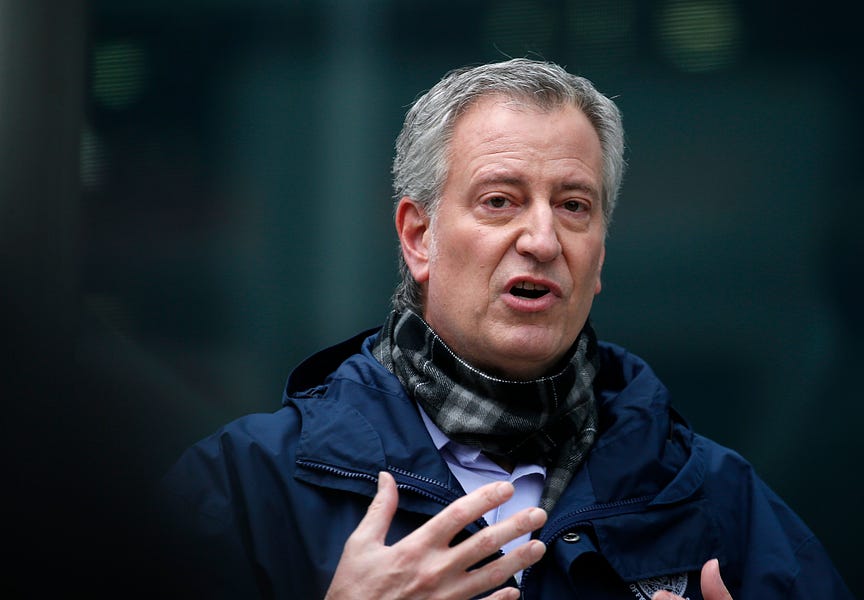On Brian Lehrer’s radio show Friday, New York City Mayor Bill de Blasio was asked a simple question: “Didn’t we know weeks and months ago that asymptomatic people can spread this disease?”
The mayor answered in the negative. “There was suspicion, but there was not evidence.”
De Blasio also claimed that “Only in the last really 48 hours or so [has the New York City Health Department] fe[lt] they’ve seen evidence around the world, particularly a new study coming out of Singapore, that shows more evidence that this disease can be spread by asymptomatic people.”
De Blasio’s comments came a day after he encouraged New Yorkers to wear face coverings, and he cited the same study in making his recommendation. “The reason for this guidance is because the studies are showing that some asymptomatic people, some presymptomatic people appear to actually be transmitting this disease,” said de Blasio. “We don’t have perfect evidence. It doesn’t conform with what the initial information showed us weeks ago, but it does seem to be more and more evident.”
Georgia Gov. Brian Kemp made a similar claim on Thursday. “What we’ve been telling people from directives from the CDC for weeks now, that if you start feeling bad, stay home. Those individuals could have been infecting people before they ever felt bad. But we didn’t know that until the last 24 hours.”
Contrary to those claims, solid evidence of asymptomatic transmission has been publicly available for weeks.
As The Dispatch reported in a fact check published on March 12, the CDC website states: “There have also been reports of asymptomatic infection with COVID-19.”
On February 13, Dr. Robert Redfield, the director of the Centers for Disease Control and Prevention, confirmed that asymptomatic transmission of coronavirus was happening.
“There’s been good communication with our colleagues to confirm asymptomatic infection, to confirm asymptomatic transmission, to be able to get a better handle on the clinical spectrum of illness in China. What we don’t know though is how much of the asymptomatic cases are driving transmission,” Dr. Redfield said on CNN.
As Redfield’s comments suggest, medical professionals’ understanding of the role played by asymptomatic transmission in the spread of coronavirus has evolved as data about the virus has accumulated.
During a World Health Organization briefing on March 5, Dr. Maria Van Kerkhove said: “We know that that is possible, but we do not believe that that’s a major driver of transmission.”
The study that de Blasio refers to analyzed Singapore’s 243 confirmed cases from January 23 to March 16 and found instances of asymptomatic transmission.
On March 19, CNN published an article in which several epidemiology experts confirmed asymptomatic transmission and suggested it was a major factor in the growing number of cases. “We now know that asymptomatic transmission likely [plays] an important role in spreading this virus,” said the director of the Center for Infectious Disease Research and Policy at the University of Minnesota Dr. Michael Osterholm.
“Asymptomatic and mildly symptomatic transmission are a major factor in transmission for Covid-19,” said CDC adviser and Vanderbilt School of Medicine professor Dr. William Schaffner.
And Dr. Caroline Colijn, the lead author of an international collaborative coronavirus study, said: “Our analysis would suggest that presymptomatic transmission is pretty commonplace.”
The Singapore study that de Blasio cited does indeed show evidence that coronavirus can be spread by asymptomatic carriers. But contrary to his claims, it doesn’t provide new evidence that asymptomatic transmission is occurring, it reaffirms what the health care community already knew.
If you have a claim you would like to see us fact check, please send us an email at factcheck@thedispatch.com. If you would like to suggest a correction to this piece or any other Dispatch article, please email corrections@thedispatch.com
Photograph of Bill DeBlasio by John Lamparski/NurPhoto/Getty Images.







Please note that we at The Dispatch hold ourselves, our work, and our commenters to a higher standard than other places on the internet. We welcome comments that foster genuine debate or discussion—including comments critical of us or our work—but responses that include ad hominem attacks on fellow Dispatch members or are intended to stoke fear and anger may be moderated.
With your membership, you only have the ability to comment on The Morning Dispatch articles. Consider upgrading to join the conversation everywhere.